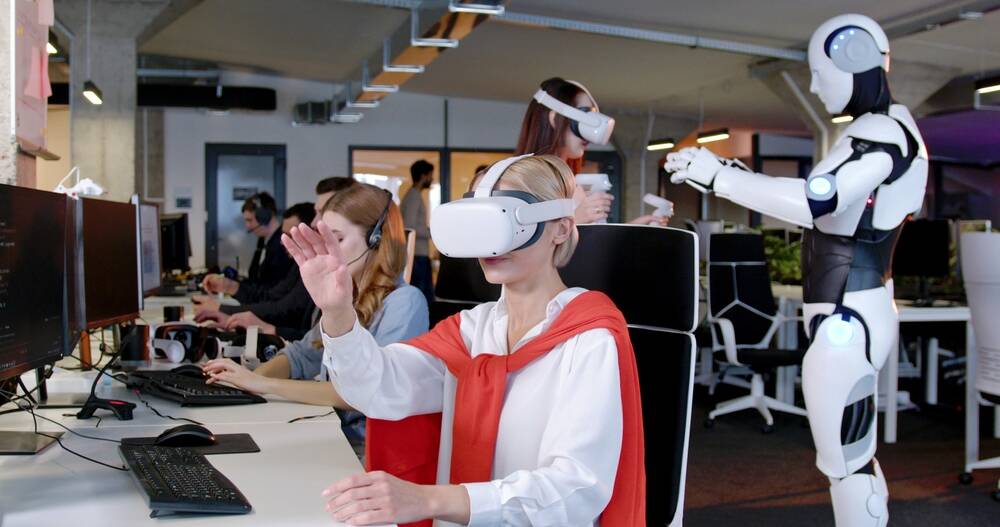
When US companies invest in skills associated with artificial intelligence, they tend to gain more educated junior employees while shedding middle-management and senior roles, according to newly published research.
That is to say, AI increases advanced degrees among staff while flattening the organization.
In a paper titled, “Firm Investments in Artificial Intelligence Technologies and Changes in Workforce Composition,” academics Tania Babina (Columbia Business School), Anastassia Fedyk (University of California at Berkeley), Alex He (University of Maryland Business School), and James Hodson (AI for Good) describe their analysis of data sets of worker resumes and job postings, with an eye toward assessing the impact of corporate commitment to skills associated with AI.
“We find that firms that invest more in AI significantly shift towards more educated workforces, with greater emphasis on STEM degrees,” the paper’s authors state. “At the same time, AI-investing firms become less top-heavy in terms of their organizational structure, with increasing shares of junior employees and less emphasis on middle-management and senior roles.”
AI-investing firms become less top-heavy … with increasing shares of junior employees and less emphasis on middle-management
AI investment in this case is inferred from job posts mentioning related terms, such as “artificial intelligence,” “computer vision,” “machine learning,” “natural language processing,” and numerous other software applications associated with these activities.
The boffins say AI investment alters the labor composition and management structure at firms, shifting organizations toward less experienced employees with high educational attainment, at the expense of middle and senior leaders.
“Specifically, a one-standard deviation change in the share of AI workers at a firm is associated with a 1.6 percent increase in the share of junior employees from 2010 to 2018, while middle management declines by 0.8 percent and senior management by 0.7 percent,” the paper states.
And in terms of educational achievement, one-standard deviation change in the share of AI workers translated into 3.7 percent more workers with associate’s or bachelor’s degrees, 2.9 percent more workers with master’s degrees, and 0.6 percent more doctoral degrees.
Those without a college education saw jobs at AI-oriented organizations decline by 7.2 percent.
This is based on an employment profile (resume) dataset covering 535 million individuals globally from Cognism, cross-referenced with the names of publicly traded firms in the Compustat dataset, and a dataset provided by Burning Glass Technologies that covers over 180 million job postings in the US in 2007 and 2010–2018. Wage and education data from Census American Community Surveys (ACS) and from Census Quarterly Workforce Indicators (QWI) was also considered.
The researchers specifically excluded technology sector firms from the various industries evaluated because tech firms are likely to be producers of AI tools.
But coincidentally the trend toward flatter organizations came up in conjunction with the recent layoffs at Meta, one of the major AI developers at the moment. In March, CEO Mark Zuckerberg said, “[O]ver the next couple of months, org leaders will announce restructuring plans focused on flattening our orgs, canceling lower priority projects, and reducing our hiring rates.”
The researchers note that the tendency of AI-enthused firms to become less top-heavy is similar to the impact of IT adoption but contrary to the effect of communications technologies, which, as documented in a 2014 paper, decrease autonomy and increase centralization.
A paper from 2021, “AI and Jobs: Evidence from Online Vacancies,” looked at Burning Glass job data to assess how the shift toward AI jobs affects wages. But those involved – Daron Acemoglu, David Autor, Jonathon Hazell, and Pascual Restrepo – found “no discernible relationship between AI exposure and employment or wage growth at the occupation or industry level.”
They concluded AI is being used to handle certain tasks previously done by people but hadn’t yet shown an effect on wages. Nonetheless, hiring more junior workers and reducing middle managers and senior managers seems likely to affect corporate salary obligations at some point.
The more recent workforce composition paper by Babina et al suggests that while the predictive power of AI lets employees make better decisions with less need for managerial oversight, it differs from previous automation that took over routine tasks completely.
“AI investments are not associated with the reduction in demand for high-skilled workers performing prediction tasks, instead increasing the share of high-skilled labor at the firm level,” the authors observe.
For low-skilled workers, the opportunities look less promising. ®
- SEO Powered Content & PR Distribution. Get Amplified Today.
- EVM Finance. Unified Interface for Decentralized Finance. Access Here.
- Quantum Media Group. IR/PR Amplified. Access Here.
- PlatoAiStream. Web3 Data Intelligence. Knowledge Amplified. Access Here.
- Source: https://go.theregister.com/feed/www.theregister.com/2023/06/12/ai_recruitment/
- :is
- :not
- $UP
- 1
- 180
- 2013
- 2014
- 2018
- 2021
- 7
- 8
- 9
- a
- academics
- According
- achievement
- activities
- Adoption
- advanced
- affect
- AI
- alex
- also
- American
- among
- an
- analysis
- and
- Announce
- applications
- ARE
- artificial
- artificial intelligence
- AS
- assess
- Assessing
- Associate
- associated
- At
- authors
- Automation
- based
- BE
- because
- become
- being
- Berkeley
- Better
- Betting
- between
- bosses
- burning
- business
- Business School
- but
- by
- california
- came
- case
- Census
- Centralization
- ceo
- certain
- change
- Changes
- CO
- College
- COLUMBIA
- commitment
- Communications
- community
- Companies
- completely
- computer
- Computer Vision
- concluded
- conjunction
- considered
- contrary
- Corporate
- Couple
- covering
- Covers
- data
- data sets
- David
- decisions
- Decline
- Declines
- decrease
- Demand
- describe
- developers
- deviation
- done
- Education
- educational
- effect
- emphasis
- employees
- employment
- evaluated
- evidence
- excluded
- experienced
- Exposure
- eye
- FB
- fewer
- Find
- Firm
- firms
- focused
- For
- found
- from
- from 2021
- Gain
- glass
- Globally
- good
- greater
- Growth
- handle
- he
- High
- Hiring
- How
- HTTPS
- Impact
- in
- Increase
- Increases
- increasing
- Indicators
- individuals
- industries
- industry
- instead
- Intelligence
- into
- Invest
- investment
- Investments
- involved
- IT
- Job
- Jobs
- jpg
- labor
- language
- layoffs
- leaders
- Leads
- learning
- less
- Lets
- Level
- likely
- Look
- looked
- lower
- machine
- machine learning
- major
- make
- management
- managerial
- Managers
- March
- mark
- mark zuckerberg
- Maryland
- master
- Meta
- Middle
- million
- moment
- months
- more
- names
- Natural
- Natural Language Processing
- Need
- newly
- next
- no
- numerous
- obligations
- observe
- occupation
- of
- on
- ONE
- online
- opportunities
- or
- organization
- organizational
- organizations
- Other
- our
- over
- Oversight
- Paper
- People
- percent
- performing
- plans
- plato
- Plato Data Intelligence
- PlatoData
- Point
- Posts
- power
- prediction
- previous
- previously
- priority
- processing
- Producers
- Profile
- projects
- promising
- provided
- publicly
- published
- Rates
- recent
- reducing
- reduction
- related
- relationship
- research
- researchers
- restructuring
- resume
- roles
- s
- salary
- same
- saw
- say
- School
- sector
- seems
- senior
- Sets
- Share
- Shares
- shift
- SHIFTING
- shown
- significantly
- similar
- skills
- Software
- some
- specifically
- Staff
- State
- States
- Stem
- structure
- such
- Suggests
- tasks
- tech
- Technologies
- Technology
- Technology sector
- terms
- that
- The
- their
- These
- they
- this
- those
- time
- titled
- to
- took
- tools
- toward
- towards
- traded
- Trend
- university
- University of California
- us
- used
- various
- vision
- wages
- was
- we
- which
- while
- will
- with
- without
- worker
- workers
- Workforce
- yet
- zephyrnet
- Zuckerberg













